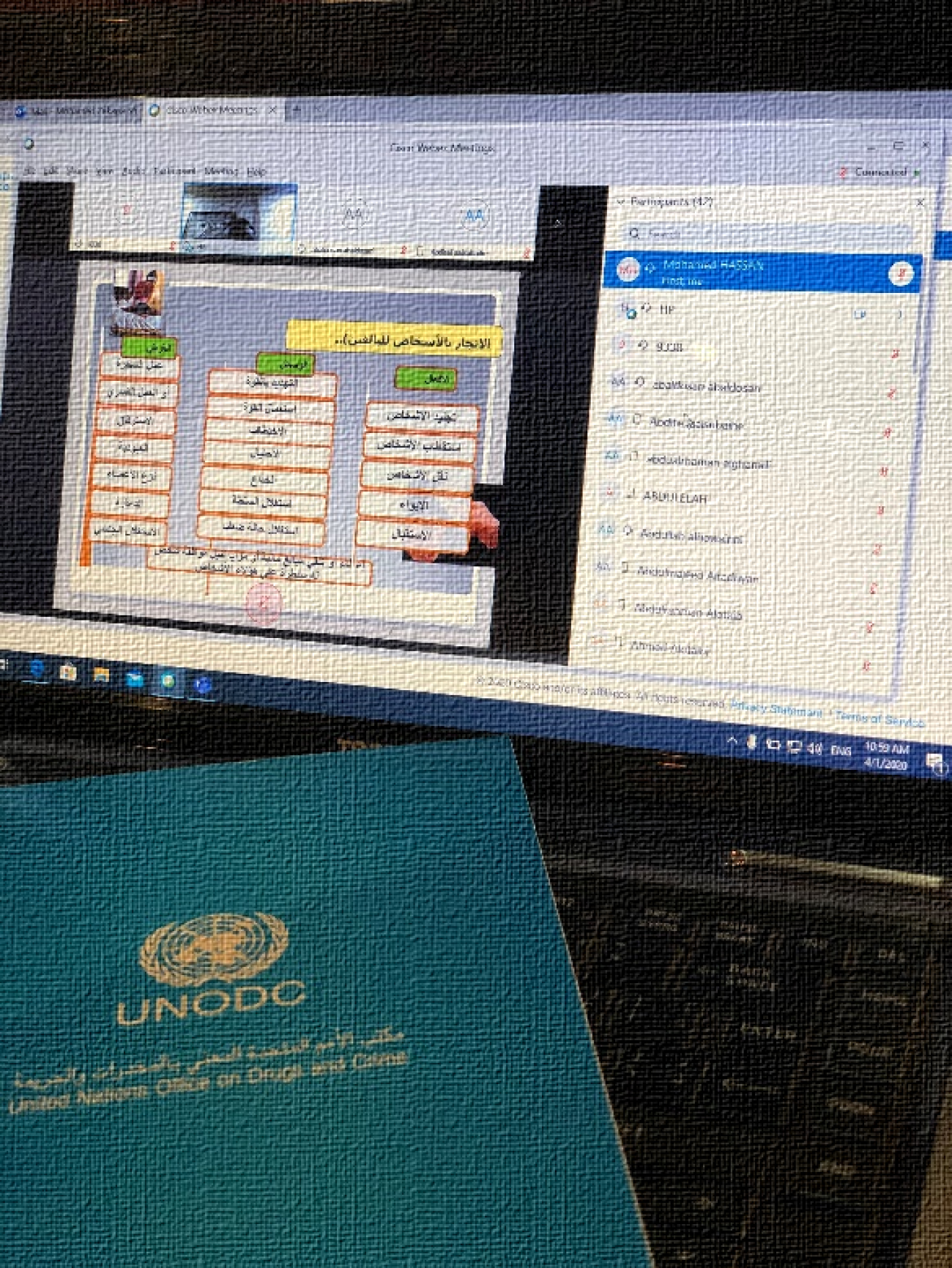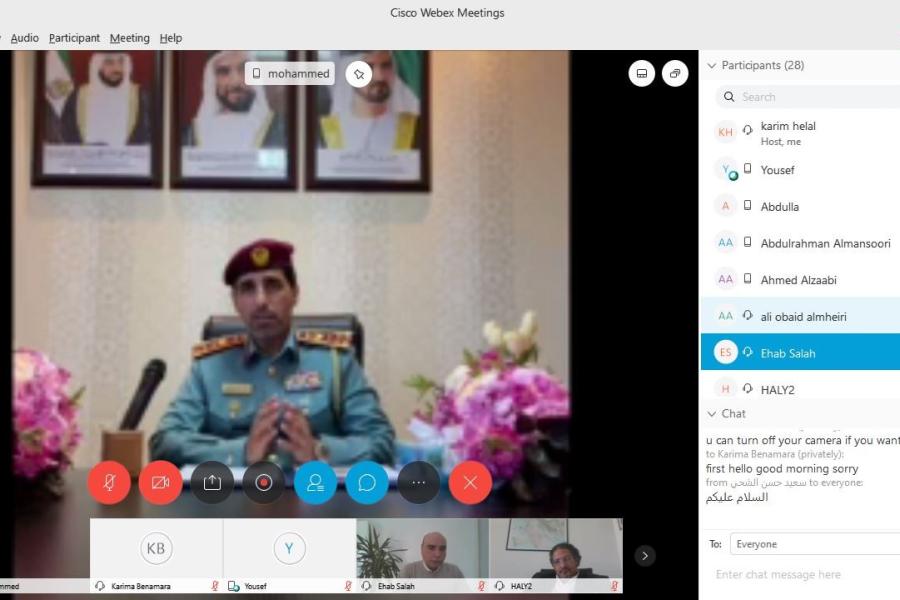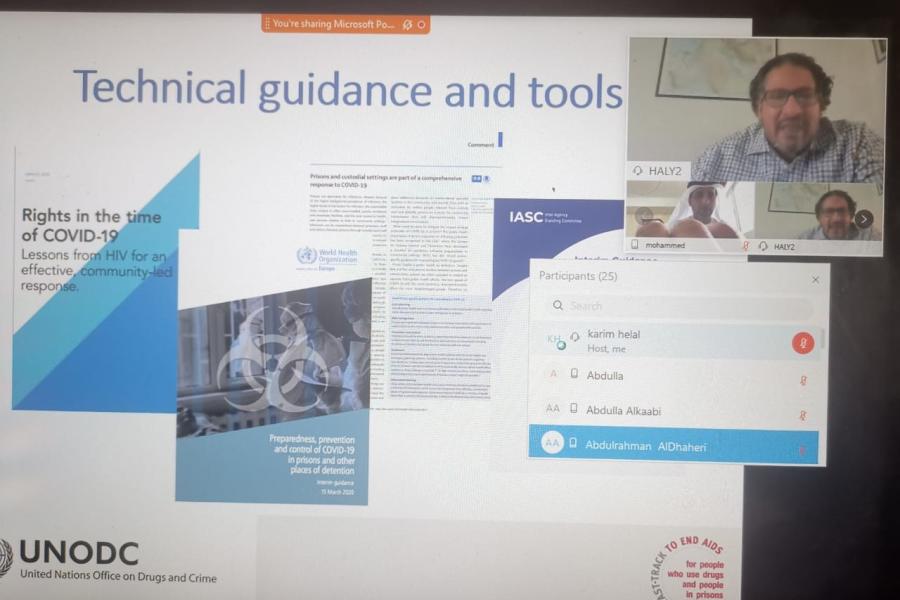Continuous Work to Deliver Saudi Arabia's New Anti-Human-Trafficking Measures Despite the Covid-19

“The fact that the capacity-building program continues even during this unfortunate pandemic, reflects the commitment and determination of the Kingdom"
1 April 2020 – RIYADH – ABU DHABI
As one of the immediate responses to the challenges posed by Covid-19 situation in implementation of the programmes, UNODC Office for the GCC Region (OGGCR) is utilizing information and communications technology for the delivery of capacity building in Kingdom of Saudi Arabia. In this context an on-line workshop is being delivered to the counterparts of the National Committee for Combating Human Trafficking (NCCHT) on 1-2 April 2020 on the “Implementation of National Referral Mechanism” with the participation of 42 representatives/experts including 13 women.
This was one of the planned activities of the recently initiated project entitled “Support and strengthen national capacities to effectively prevent, suppress and punish trafficking in persons (TiP) in accordance with international standards and best practices in Kingdom of Saudi Arabia”. The two-year project which intends to support the NCCHT in leading and coordinating national efforts towards effectively preventing, suppressing and punishing trafficking in persons (TiP), while providing victims with adequate protection, support and care, to fulfil the Kingdom’s relevant international obligations is focusing on development and implementation of a National Referral Mechanism (NRM) by creating two (2) in-house teams of experts, using a training-of-trainers methodology: the National Referral Mechanism (NRM) team that will serve as the executive arm of the NCCHT to carry out the process and/or case management with any of the NRM stakeholders; and the TiP data management team that will carry out reporting as per national and international requirements as well as support and advise the NCCHT on the development of an informed and evidence-based National Action Plan to Combat TiP.
Despite the Covid- 19 outbreak and situations related to that, the project is on track and has already reached an important milestone. On 31 of March, the Kingdom of Saudi Arabia’s National Committee to Combat Human Trafficking (NCCHT), in cooperation with the United Nations Office on Drugs and Crime (UNODC) and the International Organization of Migration (IOM), has launched a “National Referral Mechanism,” which outlines best practices for handling cases of trafficking in persons, specifying the coordination of roles and responsibilities of the mandated authorities in the Kingdom. The Mechanism is a collaborative framework that helps government officials to coordinate their efforts to better prevent trafficking in persons, protect victims or potential victims of human trafficking in the Kingdom, and investigate and prosecute suspected perpetrators.
The NCCHT, in collaboration with the UNODC and IOM, has begun to jointly train key members of the national anti-trafficking team in their respective roles to identify, refer and protect potential victims. Key staff, including labor inspectors, health professionals, and civil society representatives will learn a number of new skills depending on the roles mandated to them to help identify early warning signs of human trafficking and develop standard operating procedures to guide response staff. Despite the ongoing COVID-19 pandemic, the government is working closely with all parties to ensure that this valuable training continues through the use of teleconferencing.
“The fact that the capacity-building program continues even during this unfortunate pandemic, reflects the commitment and determination of the Kingdom toward improving the national response toward trafficking in persons cases,” said Dr. Hatem Aly, Regional Representative of the Office for the Gulf Cooperation Council Region. He continued, “it is our pleasure and duty to partner with the NCCHT, to provide our tools and expertise to help implement these important national reforms.”
With an estimated 13 million foreign workers (38.3% of an overall population of 34 million people), this move stands to dramatically improve protection measures for a significant number of people. Men and women – primarily from South and Southeast Asia and Africa – voluntarily migrate to Saudi Arabia to work in a variety of sectors, including construction and domestic service. While these workers send valuable remittances to their home countries, some workers can become vulnerable to forced labor.
According to Mohamed El Zarkani, IOM Bahrain’s Chief of Mission, “The launch of the NRM is a key milestone in the fight to combat trafficking in persons in the Kingdom of Saudi Arabia.” He added that, “We are working in harmony, simultaneously, with a leading UNODC program focusing on partnership, prosecution, and data management. The collaboration shows a welcome and timely step into international collaboration on the subject of trafficking.”
The unveiling of the Mechanism coincides with the launch of an anonymous digital reporting service, embedded in the NCCHT website, for persons with information on possible human-trafficking violations in the Kingdom. The referral service will be expanded to include a 24/7 hotline and mobile application, both of which are currently under development.
“Human trafficking is an affront to the dignity of all humanity,” said Dr. Awwad Alawwad, Chair of the NCCHT. “It is our duty to eradicate this heinous practice and I am proud to report that the launch of the National Referral Mechanism is a major step to that end. The Mechanism will be complemented by additional human rights reforms which will further improve the quality of life of all citizens and residents of the Kingdom – barring none.”
This week also saw the delivery of another on-line workshop by OGCCR about measures on the prevention of communicable diseases, including COVID-19, in prison settings. This workshop provided by Dr. Hatem Aly, Regional Representative of the Office for the Gulf Cooperation Council Region and Dr. Ehab Salah from Prisons and HIV Advisor, HIV/AIDS Section, Drug Prevention and Health Branch of the United Nations Office on Drugs and Crime (UNODC) was an immediate response to the Covid-19 pandemic and was delivered from 31 March to 2 April. A total of 27 selected law enforcement officers from the Human Rights Department of the Ministry of Interior of the United Arab Emirates, and from prisons across seven emirates including the detention center for juveniles attended the online workshop. Topics covered in the workshop ranged from risks, transmission routes, and symptoms of infection with COVID-19, especially in the prison settings to protecting those in custody from infection (IEC) and care for those who become infected. Protections of staff including health care staff from infection and maintaining general and mental health among prisoners/detainees during the pandemic and ensuring access to treatment and commodities to those with other health conditions and special needs were among the topics discussed.


Participants have expressed their appreciation to the UNODC for providing this type of technical assistance activity especially at this extraordinary time when it was needed the most.

